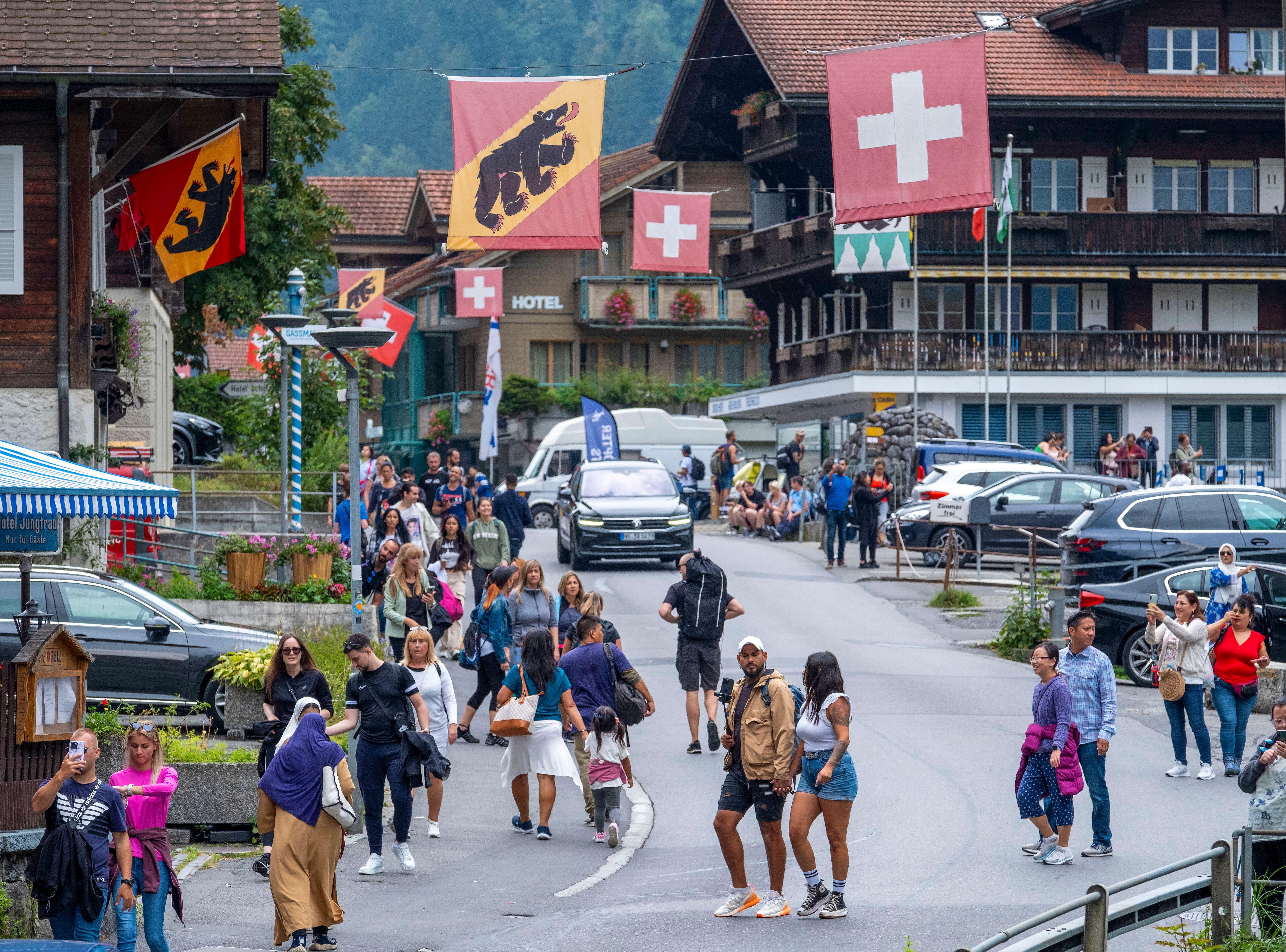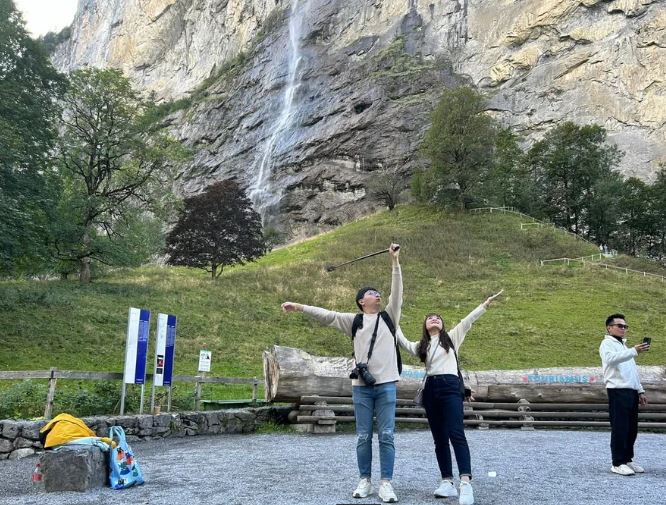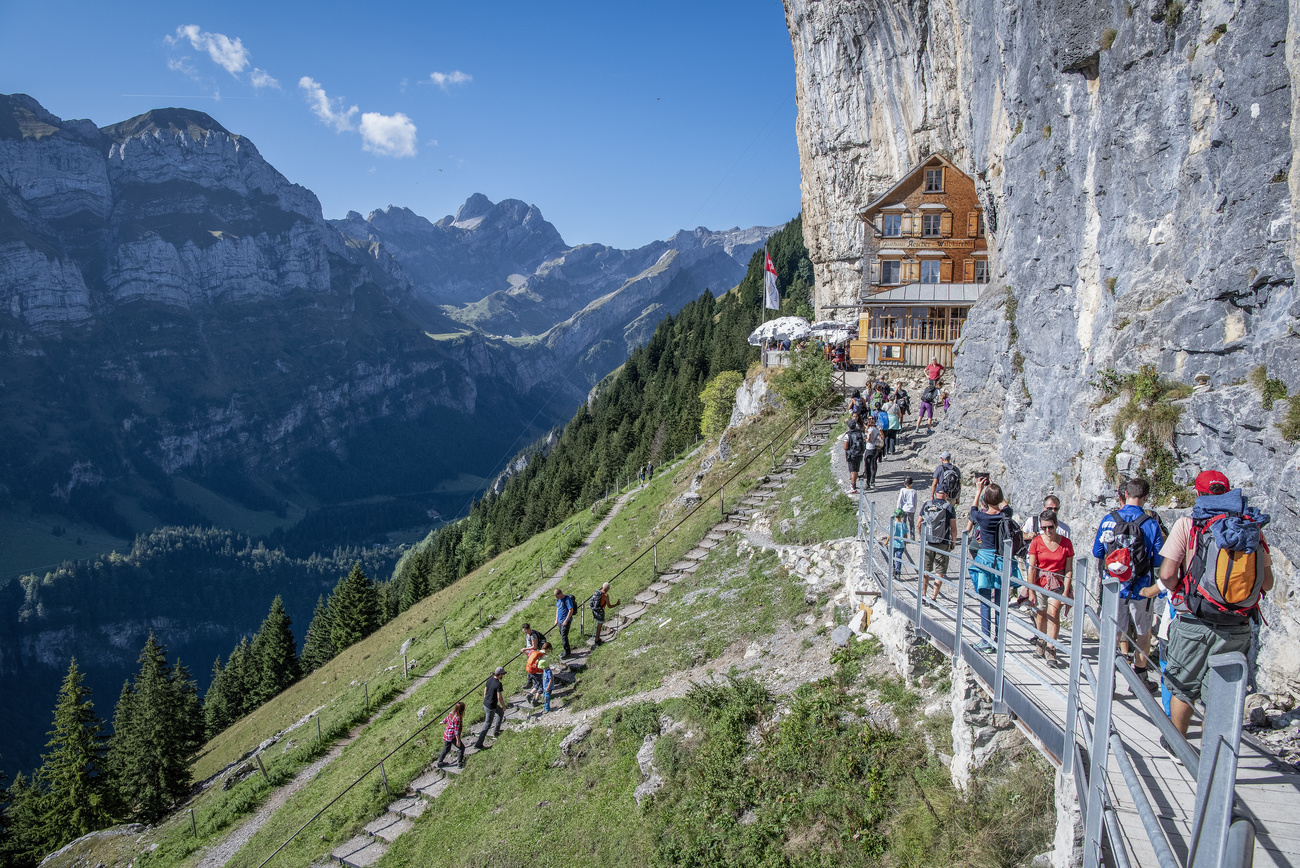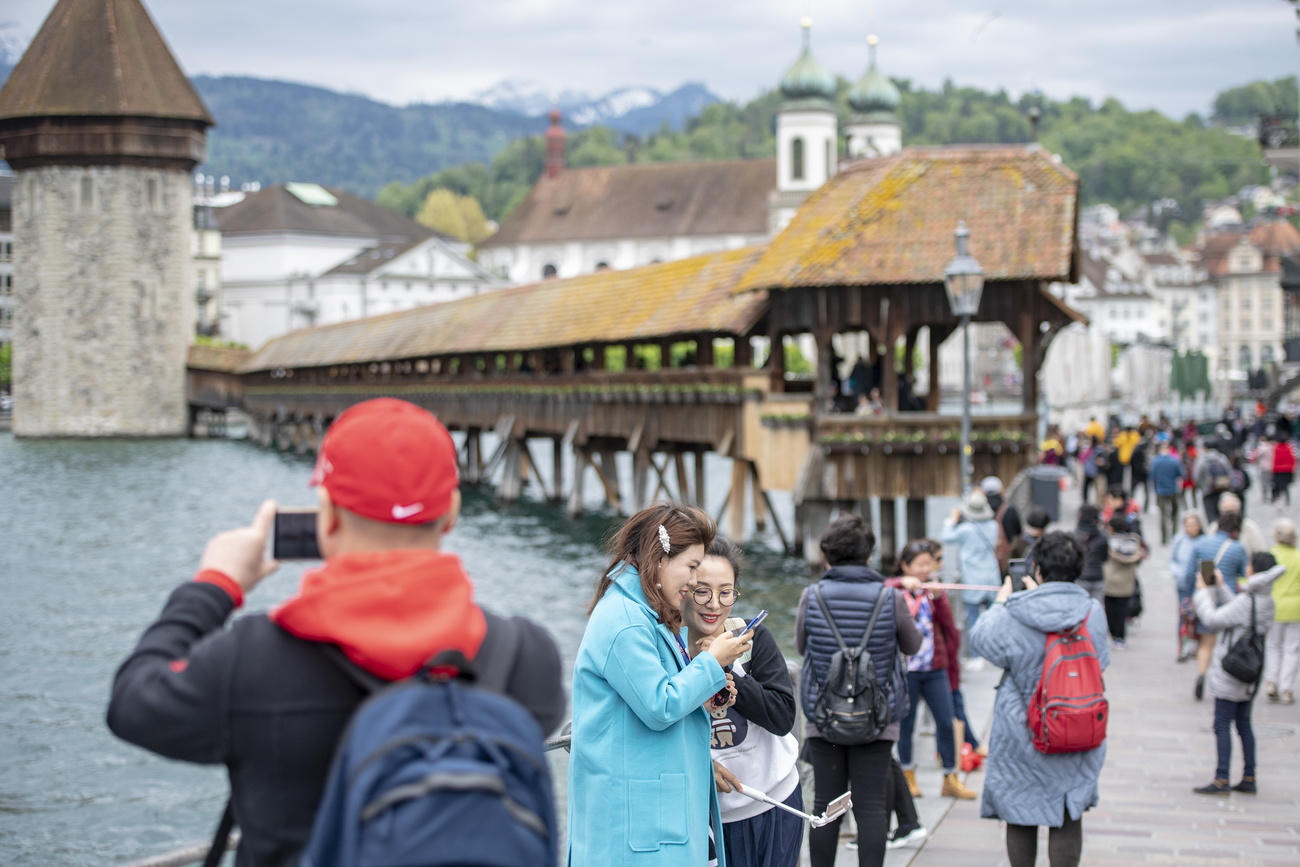Swiss village of Lauterbrunnen mulls Venice-style tourist entry charge

From Machu Picchu to Venice, overtourism at “must-see” sites is a global problem with complex causes. Lauterbrunnen, with its Instagram-friendly Alpine waterfalls and cliffs, is also a victim. It is now considering whether to follow Venice and start charging day-trippers for access.
Lauterbrunnen in the Bernese Oberland is a picture-postcard setting. Nestled in a lush valley, its soaring cliffs, snowy peaks, 300-metre Staubbach Falls and Alpine charm have made it a popular destination, especially on social media.
The downside is that the village of 2,400 residents now suffers from congested streets, car parks and public transport, rubbish-strewn roads and higher rents. “We feel like employees in an amusement park,” village priest Markus Tschanz told Swiss public radio, SRF, last year.
Tired of too many tourists, the local authorities have created a working group to find ways of curbing overtourism. One measure under consideration is to follow Venice and charge passing guests CHF5 ($5.50)-CHF10 a day, the Berner Zeitung reportedExternal link this week.
Venice last month became the first city in the world to introduce a payment system for tourists in an effort to thin the crowds that throng the canals during the peak holiday season. It is being tested for 29 days.

More
Mass tourism: “We feel like employees in a theme park”
A Lauterbrunnen version could be introduced using an app on daytrippers’ smartphones, explained the mayor, Karl Näpflin. Anyone arriving in Lauterbrunnen by car for the day would have to pay the entry charge. “The exception would be guests who have booked an offer such as a hotel or an excursion or who arrive by public transport,” he explained.
Random checks would be carried out in the village to make sure people actually pay. But such a drastic measure won’t be introduced this summer, as clarifications are still needed, the paper noted.
‘Challenging to implement’
Many tourism destinations are watching Venice to see if and how this scheme works, Fabian Weber, a researcher into tourism at the Lucerne University of Applied Sciences and Arts, told SWI swissinfo.ch.
While it is “understandable” that such a solution is being considered, Weber is unsure how easy it will be to introduce.
“It’s very challenging to implement such an entry fee in a public space such as a village or valley. We don’t have much experience and we don’t know if it works,” he said.
Since the end of the Covid-19 pandemic, more and more people have been taking breaks in Switzerland. Last year saw a record number of hotel guests with 41.8 million overnight stays across the country, and this year has continued in a similar vein, largely driven by foreign visitors.
Last summer was especially busy, with numerous holidaymakers from the United States, China, South Korea, India and the UK.
While almost all tourist regions registered an increase in overnight stays last summer, the central Bernese Oberland region, with its famous peaks and lakes, sawExternal link the biggest rise (+434,000 / +13.2%).
“My assumption is that it would probably not have a huge impact on the numbers of tourists, but at least it could raise money that could be invested in measures to better manage visitor flows or capacities, or compensate for damages. Most tourism fees up to now don’t really curb the numbers. But they give some leeway when it comes to managing tourism development.”
Other Swiss tourism hotspots
Lauterbrunnen is not the only Swiss region trying to control waves of tourists. The lakeside village of Iseltwald in the Bernese Oberland was brought to a standstill a couple of years ago by an unexpected influx of fans of Netflix series Crash Landing on You. The Swiss village that features in the popular South Korean series decided to impose a fee on visitors – a CHF5 charge to take selfies by the lake – and traffic controls to avoid being overrun.

More
Appenzell proposes to limit mass tourism
Canton Appenzell Inner Rhodes in northeastern Switzerland, with its hiking trails and spectacular locations such as the Äscher-Wildkirchli guest house in Alpstein, which gained worldwide fame after gracing the cover of a National Geographic book in 2018, is also grappling with this issue.
In southern Switzerland, Ticino’s Verzasca valley and its turquoise waters have seen an explosion in the number of visitorsExternal link, especially due to its popularity on Instagram.
“Verzasca remains very popular. Especially on weekends when day tourists arrive from Lombardy,” the mayor of Verzasca, Ivo Bordoli, told SWI swissinfo.ch. After “The Maldives of Milan” viral video in 2017, the local authorities introduced paid parking; previously spaces were free. Now they are looking into the possibility of a quota on traffic.

More
Lucerne considers coach tax, other measures to manage tourist influx
In recent years the central Swiss city of Lucerne has also been struggling with large numbers of coach groups, especially tourists from China. During the pandemic the number of foreign holidaymakers collapsed but individual travellers have started returning and big coach parties are expected to come back strongly.
“I expect the situation will become unmanageable again, as they are struggling with the management of the big coaches again,” said Jürg Stettler, head of the Institute of Tourism at Lucerne University of Applied Sciences and Arts. “The number of group travellers will increase for sure. It’s just a question of how fast.”
Expected global rise in tourism
This year global tourism is set to fully recover from the Covid-19 pandemic. The United Nations’ World Tourism Organisation expects 2024 to be a record year for international arrivals across the planet. The negative consequences of overtourism are therefore likely to remain a hot topic of debate.
The causes of global overtourism – the arrival of too many sightseers in one place at the same time – are complex. Elements include the huge growth of the middle classes in India and China, cheap airfares and the expansion of online booking platforms.
But as Sina Hardaker, an economic geographer at the Julius Maximilian University of Würzburg, told the Swiss Horizons MagazineExternal link, “platforms such as Airbnb are not just increasing accommodation capacity but are also changing the morphology of a city. In other words, they are changing the way a city develops and is structured”.
The rise of social media has also created a generation obsessed with taking selfies in front of the world’s great works of art, architecture or nature.
“Lauterbrunnen definitely has an overtourism problem. But it’s not a result of their success but of their interesting ‘Instagrammable’ waterfall [Staubbach Falls],” said Stettler.
The valley already has high numbers of people passing through to experience the nearby Alps and glaciers. “Now on top of this you have this ‘waterfall-scenery-picture-taking’ tourism,” he commented.
As the planet slowly heats up, are the Swiss Alps at risk of becoming swamped by even more tourists and their phones in search of cooler climes?
Probably, says Stettler: “The number of visitors in spring, summer and autumn will increase due to the impact of climate change. But the numbers in winter will decrease because of the snow conditions.” Specific hotspots that are already experiencing overtourism issues in summer, for example the Jungfrau and Titlis regions, Zermatt and Lucerne, will find themselves under pressure, he added.
More

In compliance with the JTI standards
More: SWI swissinfo.ch certified by the Journalism Trust Initiative









You can find an overview of ongoing debates with our journalists here . Please join us!
If you want to start a conversation about a topic raised in this article or want to report factual errors, email us at english@swissinfo.ch.